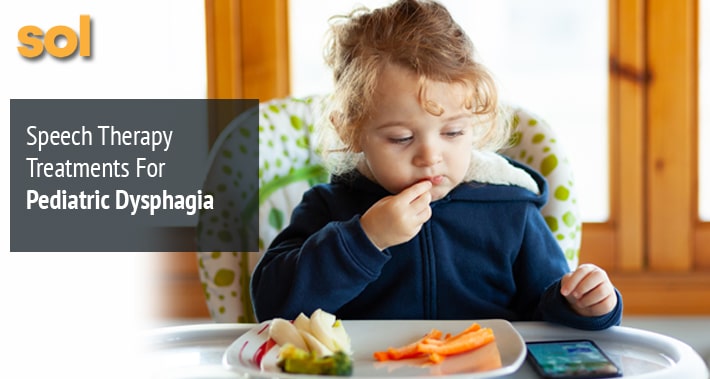
Parents know that it’s normal to be worried about your child’s eating habits from time to time, especially as they first start to eat solid foods.
After all, there’s a lot that goes into eating and drinking.
You have to open your mouth.
You have to put the right amount of food in your mouth.
You have to chew it.
You have to position it on your tongue.
You have to swallow it.
Then your body has to use a series of muscle contractions to carry it through your esophagus and into your stomach.
That’s a lot of work!
If your child has difficulty with feeding, including swallowing, it might surprise you to know that speech therapy for children in Austin, Texas can actually help with feeding problems.
Speech therapists can help with speech, but we also help with language and feeding issues as well.
Let’s take a look at one particular type of feeding issue – pediatric dysphagia.
What Is Pediatric Dysphagia?
Pediatric dysphagia is also known as swallowing disorder, which happens when your child has trouble swallowing food or drinks.
There are many steps to the swallowing process and pediatric dysphagia can occur at any of the steps: chewing, positioning the food on the tongue, or the act of swallowing itself.
An important component of swallowing is keeping your airway protected.
Your body protects your airway automatically as you swallow, but if your child has pediatric dysphagia, you may notice that they often choke on the food they eat, or it comes out their nose when they swallow.
Those aren’t all the symptoms of pediatric dysphagia, though.
Let’s take a more comprehensive look.
Pediatric Dysphagia Symptoms
Depending on your child’s age or level of speech milestone development, the symptoms they experience might differ.
There are many symptoms to look out for with pediatric dysphagia, including:
- Breathing difficulties when feeding
- Coughing or choking after swallowing
- Distress or crying during mealtimes
- Decreased responsiveness when your child is feeding
- Difficulty chewing foods that other children at the same age can chew
- Difficulty swallowing
- Drooling of saliva and other secretions from the mouth
- Refusal of food source
- Being congested often, especially after eating
- Frequent respiratory illness, like pneumonia
- Gagging when eating
- Loss of food or drink from the mouth while eating
- Taking longer to finish meals and snacks than other children their age
- Vomiting during or after eating
- Wet respiration
- Nasal congestion
- Retching
- Noisy breathing that’s either a high pitched sound or more low pitched, like snoring
The list of symptoms may seem overwhelming, but it’s important to remember that many of the symptoms occur only while eating or shortly after.
What Causes Pediatric Dysphagia?
There are many causes of pediatric dysphagia.
Most children who have pediatric dysphagia will have other disorders that cause it, such as:
- Complex medical conditions like heart disease, allergies, GERD, or delayed gastric emptying
- Developmental disability
- Factors that affect neuromuscular coordination, like prematurity, hypotonia, or hypertonia
- Genetic syndromes
- Neurological disorders
- Structural abnormalities, like cleft lip, cleft palate other facial abnormalities, or restrictive tethered oral tissues
RELATED: Speech Therapy Treatments For Cleft Palate And Cleft Lip
How Can Speech Therapy For Pediatric Dysphagia Help?
Speech therapists don’t just teach your child how to speak; we’re experts in all things mouth related.
Your child’s speech therapist can help figure out the best feeding techniques to make swallowing safe for your child and minimize the risks of complications.
Your pediatric speech therapist will also work to prevent more feeding problems in the future by providing your child with positive feeding related experiences as much as possible.
Let’s take a closer look at some of the ways speech therapy for pediatric dysphagia can help.

1. Behavioral Interventions
Using behavioral interventions can be helpful for children with pediatric dysphagia by helping to motivate your child to eat food.
For example, your child’s speech therapist may use a behavioral intervention technique called modeling, in which the speech therapist models for your child appropriate behavior and posture when eating.
2. Oral Motor Treatments
Oral motor treatments involve simulating the action of eating in different parts of the mouth and upper body such as the lips, jaw, tongue, soft palate, pharynx, larynx, and respiratory muscles.
Your child’s speech therapist can work with them to strengthen the muscles and mouth structures involved in swallowing and improve their ability to eat safely.
3. Feeding Strategies
There are a few different feeding strategies your child’s speech therapist can help with.
Pacing involves controlling the rate your child intakes food or liquids into the mouth and the time between swallows.
This can give your child more time for swallowing and controlling how they swallow.
It also gives them more time to take breaths between swallows.
Cue based feeding involves the speech therapist working with you to understand your infant’s cues while feeding.
Your child’s speech therapist will also help you understand your infant’s breathing and swallowing patterns and needs while you feed them, which helps you support their ability to feed safely.
Responsive feeding is another feeding strategy that involves understanding your child’s cues while eating.
Your child’s speech therapist can help you and your child learn how to communicate about feeding, like understanding when your child is full, still hungry, or needs a break from eating.
4. Diet And Feeding Modifications
Diet modifications can be an important part of making sure your child can eat safely.
Understanding what foods are best for your child to eat to help keep them safe when swallowing can be hard, but your child’s speech therapist can help guide you.
Your child’s speech therapist might suggest modifications to the texture, temperature, or portion size of foods to help safe swallowing.
They may also recommend adaptive utensils or other equipment to help increase your child’s independence while eating and develop safety habits.
5. Other Strategies
There are many other ways your child’s speech therapist can help with feeding to encourage safe swallowing.
Your child’s speech therapist can also help with postural and positioning techniques, maneuvers to help your child improve their swallowing skills, sensory stimulation techniques, and intraoral prosthetics or appliances to aid your child in swallowing safely.
Book Your Appointment With Sol Speech And Language Therapy Today
Supporting your child on their path to safe eating may feel daunting, but we’re here to help.
No matter the age or developmental stage of your child, our speech therapists can help your child learn how to safely eat and drink.
Book your appointment with Sol Speech and Language Therapy today to find out how we can help your child with pediatric dysphagia.
6448 E Hwy 290 Suite E-108,
Austin, TX 78723
(512) 368-9488
» https://g.page/r/CfRfhOpEQm7BEAE
Sol Speech & Language Therapy
555 Round Rock W Dr E-221,
Round Rock, TX 78681
(512) 808-3953
» https://g.page/r/Cb5pwCTosSEfEBM
Sol Speech & Language Therapy offers personalized skilled intervention to those struggling with their speech and language skills. Services offered include screening, consultation, and comprehensive evaluation. We also provide one-on-one and/or group therapy for speech sound disorders, receptive/expressive language delay/disorder, stuttering/cluttering, accent reduction, and much more.